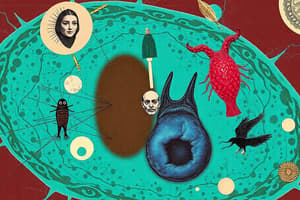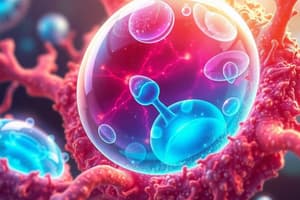Podcast
Questions and Answers
Which branch of biology focuses on the study of ecosystems and interactions among organisms?
Which branch of biology focuses on the study of ecosystems and interactions among organisms?
- Zoology
- Microbiology
- Ecology (correct)
- Botany
Which of the following statements about cell theory is accurate?
Which of the following statements about cell theory is accurate?
- The cell is the basic unit of life. (correct)
- All cells are capable of independent reproduction.
- Bacteria are composed of eukaryotic cells.
- Cells can arise spontaneously from non-cellular materials.
What is the primary function of mitochondria in eukaryotic cells?
What is the primary function of mitochondria in eukaryotic cells?
- Protein synthesis
- Storage of genetic material
- Modification of proteins
- Energy production (correct)
Which concept explains that alleles segregate during gamete formation?
Which concept explains that alleles segregate during gamete formation?
In the context of evolution, what does the term 'speciation' refer to?
In the context of evolution, what does the term 'speciation' refer to?
Which of the following is not considered a level of ecological organization?
Which of the following is not considered a level of ecological organization?
What is the primary role of ribosomes in a cell?
What is the primary role of ribosomes in a cell?
What is the main distinction between prokaryotic and eukaryotic cells?
What is the main distinction between prokaryotic and eukaryotic cells?
How do viruses reproduce?
How do viruses reproduce?
Which organ system is responsible for the transport of oxygen and nutrients in the body?
Which organ system is responsible for the transport of oxygen and nutrients in the body?
Flashcards are hidden until you start studying
Study Notes
Overview of Biology
- Definition: The science of life; studies living organisms and their interactions with the environment.
- Branches:
- Zoology: Study of animals.
- Botany: Study of plants.
- Microbiology: Study of microorganisms.
- Ecology: Study of ecosystems and interactions among organisms.
- Genetics: Study of heredity and variation in organisms.
Cell Biology
- Cell Theory:
- All living organisms are composed of cells.
- The cell is the basic unit of life.
- All cells arise from pre-existing cells.
- Types of Cells:
- Prokaryotic: No nucleus, smaller (e.g., bacteria).
- Eukaryotic: Nucleus present, larger (e.g., plants, animals).
- Cell Organelles:
- Nucleus: Contains genetic material.
- Mitochondria: Powerhouse, energy production.
- Ribosomes: Protein synthesis.
- Endoplasmic Reticulum: Synthesis of proteins (rough ER) and lipids (smooth ER).
- Golgi Apparatus: Modification and packaging of proteins.
Genetics
- DNA Structure: Double helix, composed of nucleotides (adenine, thymine, cytosine, guanine).
- Gene: A segment of DNA that codes for a protein.
- Alleles: Different versions of a gene.
- Mendelian Inheritance:
- Law of Segregation: Alleles separate during gamete formation.
- Law of Independent Assortment: Genes for different traits are inherited independently.
Evolution
- Theory of Evolution: The process through which species change over time through natural selection.
- Natural Selection: Survival and reproduction of individuals best adapted to their environment.
- Speciation: Formation of new species due to evolutionary processes.
Ecology
- Levels of Organization:
- Individual
- Population
- Community
- Ecosystem
- Biosphere
- Biomes: Large ecological areas with distinct climates and organisms (e.g., tundra, rainforest).
- Food Chains and Webs: Flow of energy through trophic levels; producers, consumers, and decomposers.
Human Biology
- Organ Systems:
- Circulatory, respiratory, digestive, nervous, muscular, skeletal, endocrine, immune, reproductive, and urinary systems.
- Homeostasis: Maintenance of stable internal conditions despite external changes.
Microbiology
- Bacteria: Prokaryotic, unicellular organisms, can be beneficial or pathogenic.
- Viruses: Non-cellular entities that require a host to reproduce.
- Fungi: Decomposers, can be unicellular (yeast) or multicellular (mold).
Plant Biology
- Photosynthesis: Process by which plants convert sunlight into chemical energy (glucose).
- Plant Structures:
- Roots: Absorb water and nutrients.
- Stems: Support and transport.
- Leaves: Site of photosynthesis.
Key Concepts
- Homeostasis: Mechanisms that maintain internal balance (e.g., temperature regulation).
- Adaptation: Traits that enhance survival and reproduction in a specific environment.
- Biodiversity: Variety of life in the world or a particular habitat; crucial for ecosystem health.
Overview of Biology
- Biology is the scientific study of life, focusing on living organisms and their interactions with their environment.
- Major branches include zoology (animals), botany (plants), microbiology (microorganisms), ecology (ecosystems), and genetics (heredity).
Cell Biology
- Cell Theory underscores that all living organisms consist of cells, which are the fundamental units of life, arising from pre-existing cells.
- Prokaryotic cells lack a nucleus and are generally smaller, while eukaryotic cells possess a nucleus and are larger.
- Key cell organelles include:
- The nucleus, housing genetic material.
- Mitochondria, responsible for energy production.
- Ribosomes, essential for protein synthesis.
- Endoplasmic Reticulum, synthesizing proteins (rough ER) and lipids (smooth ER).
- Golgi Apparatus, which modifies and packages proteins.
Genetics
- DNA is structured as a double helix made of nucleotides: adenine, thymine, cytosine, and guanine.
- Genes are DNA segments that produce proteins, while alleles are different forms of a gene.
- Mendelian Inheritance principles include:
- The Law of Segregation, stating that alleles separate during the formation of gametes.
- The Law of Independent Assortment, indicating that genes for separate traits are inherited independently.
Evolution
- The Theory of Evolution explains species transformation over time through the mechanism of natural selection.
- Natural Selection favors the survival and reproduction of individuals best suited to their environment.
- Speciation refers to the emergence of new species due to evolutionary processes.
Ecology
- Ecology is organized at various levels: individual, population, community, ecosystem, and biosphere.
- Biomes are major ecological zones characterized by specific climates and types of organisms, such as tundras and rainforests.
- Food chains and webs illustrate the flow of energy among trophic levels including producers, consumers, and decomposers.
Human Biology
- Organ systems include circulatory, respiratory, digestive, nervous, muscular, skeletal, endocrine, immune, reproductive, and urinary systems.
- Homeostasis encompasses the processes maintaining stable internal environments despite changes outside the body.
Microbiology
- Bacteria are prokaryotic, unicellular organisms that can be either beneficial or pathogenic.
- Viruses are non-cellular entities that require host organisms to replicate.
- Fungi serve as decomposers and can be unicellular (like yeast) or multicellular (like mold).
Plant Biology
- Photosynthesis enables plants to convert sunlight into chemical energy in the form of glucose.
- Key plant structures:
- Roots that absorb water and nutrients.
- Stems that provide support and transport materials.
- Leaves that facilitate photosynthesis.
Key Concepts
- Homeostasis involves mechanisms that sustain internal balance, such as temperature control.
- Adaptation refers to traits that improve an organism's chances of survival and reproduction in a given environment.
- Biodiversity signifies the variety of life forms in an ecosystem, which is vital for ecological health.
Studying That Suits You
Use AI to generate personalized quizzes and flashcards to suit your learning preferences.




